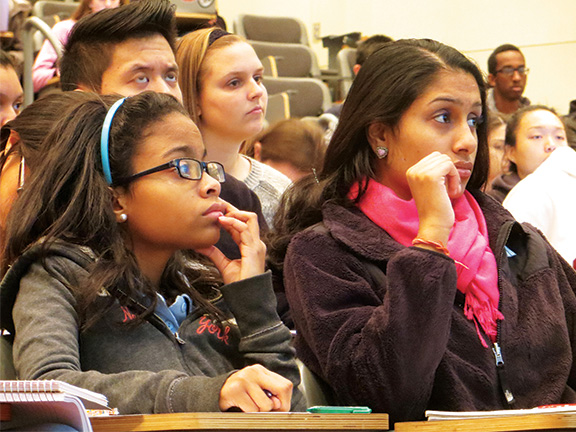
Sixth grade students from Carole Highlands Elementary School in Takoma Park and university undergraduates attend Marcia Shofner’s Principles of Biology II lecture on Wednesday, Nov. 20.
As the entire sixth-grade class of Carole Highlands Elementary School paraded into Marcia Shofner’s lecture Wednesday morning, they all had smiles on their faces. It was the first time many of the students had been on a university campus or even fathomed the idea of going to college.
The Prince George’s County elementary school qualifies as Title 1, meaning its student body is considered an underserved community, guidance counselor Cassandra Thomas said. Because most students would be the first generation in their families to go to college, Thomas said school officials are starting to think about higher education early — sometimes before the students have even started middle school.
“I want to make sure that our students are ready,” she said.
Thomas wants to ignite a desire for higher education in the students, so she thought of the idea to bring the students on a tour of this university and sit in on Shofner’s lecture, BSCI 106: Principles of Biology II. Each sixth-grader was paired with an undergraduate student buddy who helped explain concepts to the sixth-graders and did an activity with them at the end of the lecture.
“When they are in the presence of an actual college student, that person is showing interest in them and values them. I think that can actually change their life,” Shofner said. “These are the first generation. Many, if not all, have never thought about college; none of their family has ever gone to college. This is really huge, really life-changing.”
Yesterday was the first time Shofner had hosted such young visitors, but she hopes to continue the partnership as an annual event.
David Yim, a freshman physiology and neurobiology and psychology major, was one of the sixth-graders’ undergraduate peers. He said he could see a spark go off while the university students told their young counterparts about science classes and life in college.
“I asked [my buddy] what she wanted to do, and she said she’s debating between trying to be a doctor or trying to be a musical therapist,” Yim said. “I told her that both of those would be awesome and that you can either help people with music or help people with medicine.”
In Shofner’s class, the sixth-graders weren’t shy; many of them raised their hands and answered questions in front of the Biosciences Research Building lecture hall that also housed many of the 191 undergraduate students enrolled in the class.
Their confidence came partly from the past five weeks of preparation for their university visit, which included practicing answering college-level questions and speaking with students.
Shofner said she loved the participatory dynamic, which she said she hadn’t expected in her class.
“They were answering questions more than some of my [BSCI] 106 students were doing, and they were answering questions correctly,” Shofner said.
On their college field trip, the elementary schoolers weren’t only enthused by academics; hearing about the traditions and resources at this university also made them excited about life after secondary school, Thomas said.
For instance, they were “very interested” in rubbing Testudo’s nose, she said.
“You had a number of students that were taking tests, and they are actually getting ready to take their [Maryland School Assessments] too,” Thomas said. “So they were like, ‘Oh yes, let me rub Testudo.’”
The young students were also impressed by the size of McKeldin Library and its vast amount of books and technology, Thomas said. Yim said his buddy’s first response to her tour was, “Hey, your library is ginormous.”
Shofner also saw the excitement extend throughout and after her lecture. The sixth-grade students came up to her and expressed their desires to study science and matriculate at this university, she said.
As most of the young students would be first generation college students, touring this university and creating connections with undergraduates was pivotal in exciting a desire to attend college, Yim said.
“I think it’s helpful in creating a foundation, a foundation for a desire to learn,” Yim said. “If you’re just on your own, usually you’ll be a little more apathetic, and apathy doesn’t really drive inquiry really well.”



